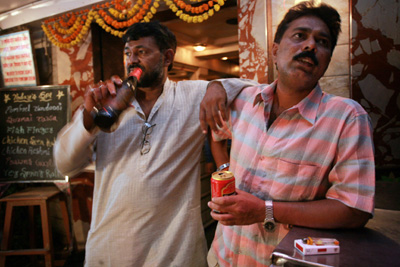InBev to enter the Indian market
InBev announces a long-term joint venture agreement with the local Pepsi bottler, the RKJ group.
SABMiller is there, Scottish & Newcastle is there, Anheuser-Busch is there, Carlsberg is there, so InBev had to clinch a deal too. Or could they have given the Indian market, which for decades has been termed the up and coming mega market of the brewing industry – population-wise on par with China - a miss?
No.
With InBev having entered into a long-term joint venture agreement with the RKJ group, a leading Pepsi bottler, it looks like it’s soon going to get rather crowdy in this 9 million hl beer market.
InBev said it will take an initial 49 percent stake in the venture with the option to increase its participation at a later time. It is anticipated that the joint venture will have access to the strong distribution network developed by RKJ and InBev’s attractive portfolio of beer brands. Terms of the agreement were not disclosed.
This announcement brings a long story to a – temporary - close. Over the years, the Indian media, ever keen on sucking the tiniest detail out of good gossip, have kept a close eye on the RKJ group, which is owned by the, what they call, “colourful business man” Ravi K. Jaipuria (hence the RKJ group), the youngest of the three New Delhi-based Jaipuria brothers. His business interests range from beverages to food and education.
Ravi K. Jaipuria began his business career with a Pepsi licence in 1991, which then led to a franchisee for Yum Restaurants International (formerly owned by PepsiCo) and a total of 40 plus Pizza Huts and one KFC restaurant. Having secured Pepsi’s lead over Coca-Cola in India (so Mr Jaipuria’s website claims), the entrepreneur in 1998 won a coveted award as PepsiCo’s top bottler in the world. The award was presented by ex-President George Bush Sr and Mr Jaipuria took 16 members of his family for the ceremonies in Hawaii. Pepsi had a tough time finding the right food for the staunchly vegetarian family.
According to media reports in India, Mr Jaipuria was not InBev’s first choice of a partner. InBev had earlier planned to enter the country with the help of its former Russian partner, the Indian family Khemka of the Sun Group. Together the Indians and the Belgians had set up Sun Interbrew in Russia. However, in 2005 Mr Jaipuria must have won the Belgians over. Indian papers reported that back then he was close to inking a 50:50 joint venture contract with InBev.
In the course of 2006 Mr Jaipuria began talks with independent breweries in India to either lease or buyout brewing capacities in anticipation of the deal going through. However, the proposed joint venture for manufacturing, distribution and marketing beer ran into trouble with a change in InBev’s operational management. That was a not-so-well disguised reference to the Brazilians taking control of InBev. According to the Indian gossip mongers, the new honchos in charge of the India plans wanted to renegotiate the joint venture structure with majority holding for InBev.
However, Mr Jaipuria was not interested in settling for a minority stake. And so they went their separate ways. Considering the recent flurry of activity in the Indian beer market, InBev was obviously forced to reconsider its tough stance and agreed to settle for less than initially hoped for: 49 percent.
In the Indian media one could read that Mr Jaipuria graciously granted InBev the option to increase its stake at a later date.
Nevertheless, despite the officious sounding statement, Indian pundits claim that the negotiations are far from over and that the proper joint venture between InBev and Mr Jaipuria may only be in place by December this year.
InBev, which brings in strong know-how and brands, hopes to ride on the strong distribution network of RKJ Group. It distributes over 40 million cases of Pepsi bottles per year. The popular beer brand Kingfisher sells only 20 million cases, according the UB Group website. “‘That’s what we plan to leverage,” Mr Jaipuria was quoted as saying. Elaborating further he also said that they were planning to acquire breweries as well as set up greenfield breweries. For starters, the joint venture would source beer from other breweries, and will ensure quality by having its brewmasters sit in the plant. The products will be launched the end of 2007, but will available across country by 2008.
Indian sources say that the beer market is growing at 27 percent per year.
Seems like all the big players in the business have entered India. In February this year, Anheuser-Busch formed a joint venture with Crown Beers of Hyderabad to brew, market and distribute Budweiser and other brands in India.
This announcement followed hard on the heels of Carlsberg’s. In November 2006, Carlsberg had formed South Asia Breweries, in which Carlsberg holds 45 percent of the shares, the Industrialization Fund for Developing Countries ("IFU") holds 10 percent, and the remaining 45 percent is owned by a group of investors, lead by Carlsberg’s partner in Sri Lanka, The Lion Brewery Ceylon Ltd.
South Asia Breweries has since acquired an existing 150,000 hl brewery in the state of Himachal Pradesh, 280 km north of the Indian capital of New Delhi.
The other project, a greenfield brewery with an initial capacity of 450,000 hl in the state of Rajasthan south west of Delhi, will be completed early in 2008.
Of course, all these various joint ventures and investments bank on the hope that the government liberalises the trade and retail sale of liquor in the country.
SABMiller India is the country’s number two brewer with a market share in excess of 30 percent. Together with United Breweries, in which S&N has a 37 percent stake, they control more than 80 percent of the market.

